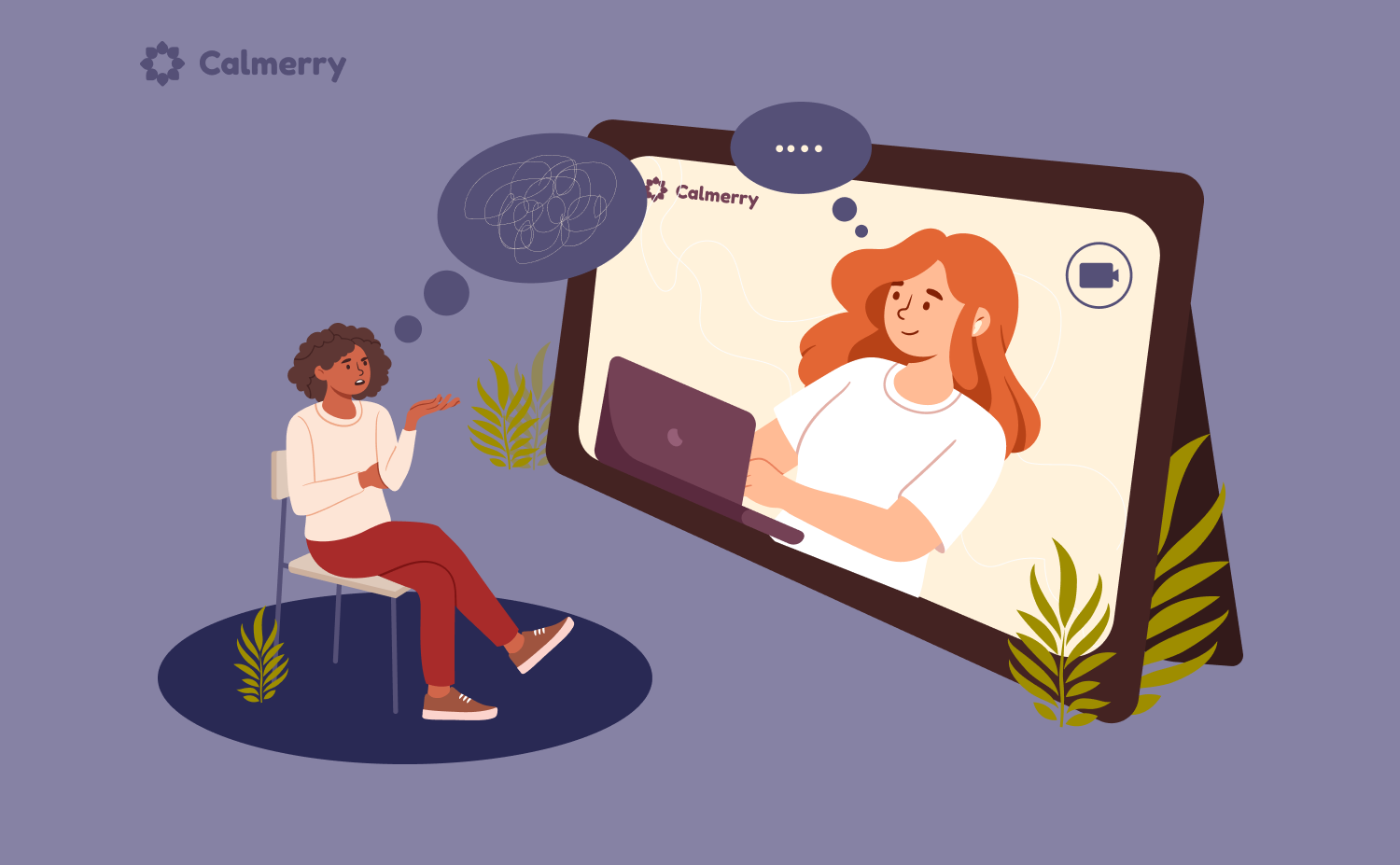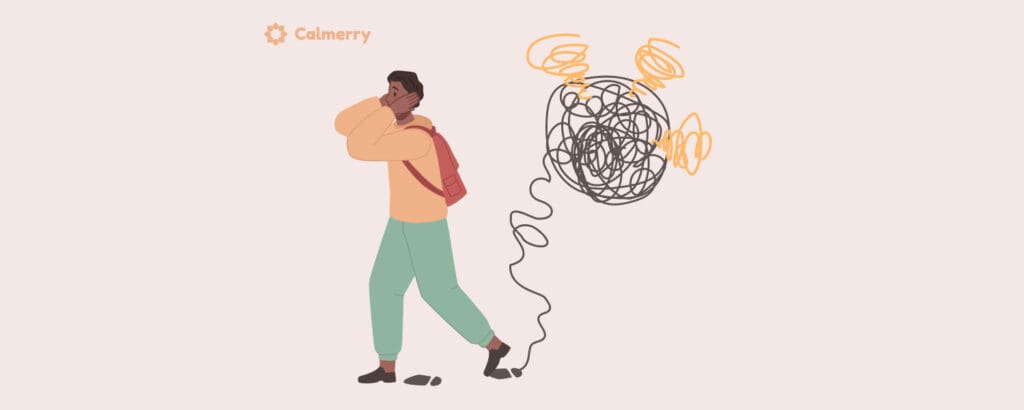How to Calm Anxiety at Night: 10+ Strategies That Work
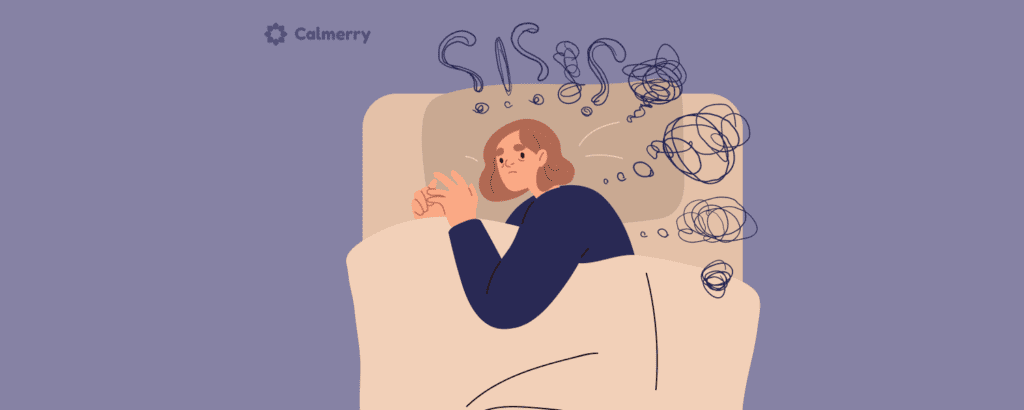
In this article
At the end of a long day, you probably feel ready to fall into bed and catch up on some much-needed sleep. But for many of us, it’s common to find that the minute your head hits the pillow, your mind takes the opportunity to start racing with anxiety.
Before you know it, the minutes and hours are ticking by, leaving you feeling even more anxious, stressed, and tired.
Here, we will consider the common causes of anxiety and share some expert tips on how to calm anxiety at night naturally to help you fall into a restful sleep more quickly.
Who is affected by anxiety?
Anxiety is more common than you might expect. Each year in the USA, over 40 million adults experience an anxiety disorder. Anxiety can affect anyone, but it may be related to genetics, traumatic life events, personality traits, and brain chemistry. Anxiety may also accompany other mental health conditions, including depression.
It is also more common to have anxiety as an adult if you experienced it as a child. About 25% of children in the USA are affected by anxiety, so you may recognize that you had some of the cardinal symptoms at an earlier stage in your life.
Anxiety disorders are more common in women than men. Women with anxiety are also more likely than men to experience another mental health disorder, such as eating disorders or depression. Furthermore, anxiety is not only more prevalent in women than men, but it is also often more severe.
With women being affected more severely by anxiety, it is reassuring to know that there are ways that you can calm anxiety, regardless of the time of day when you experience it most often.
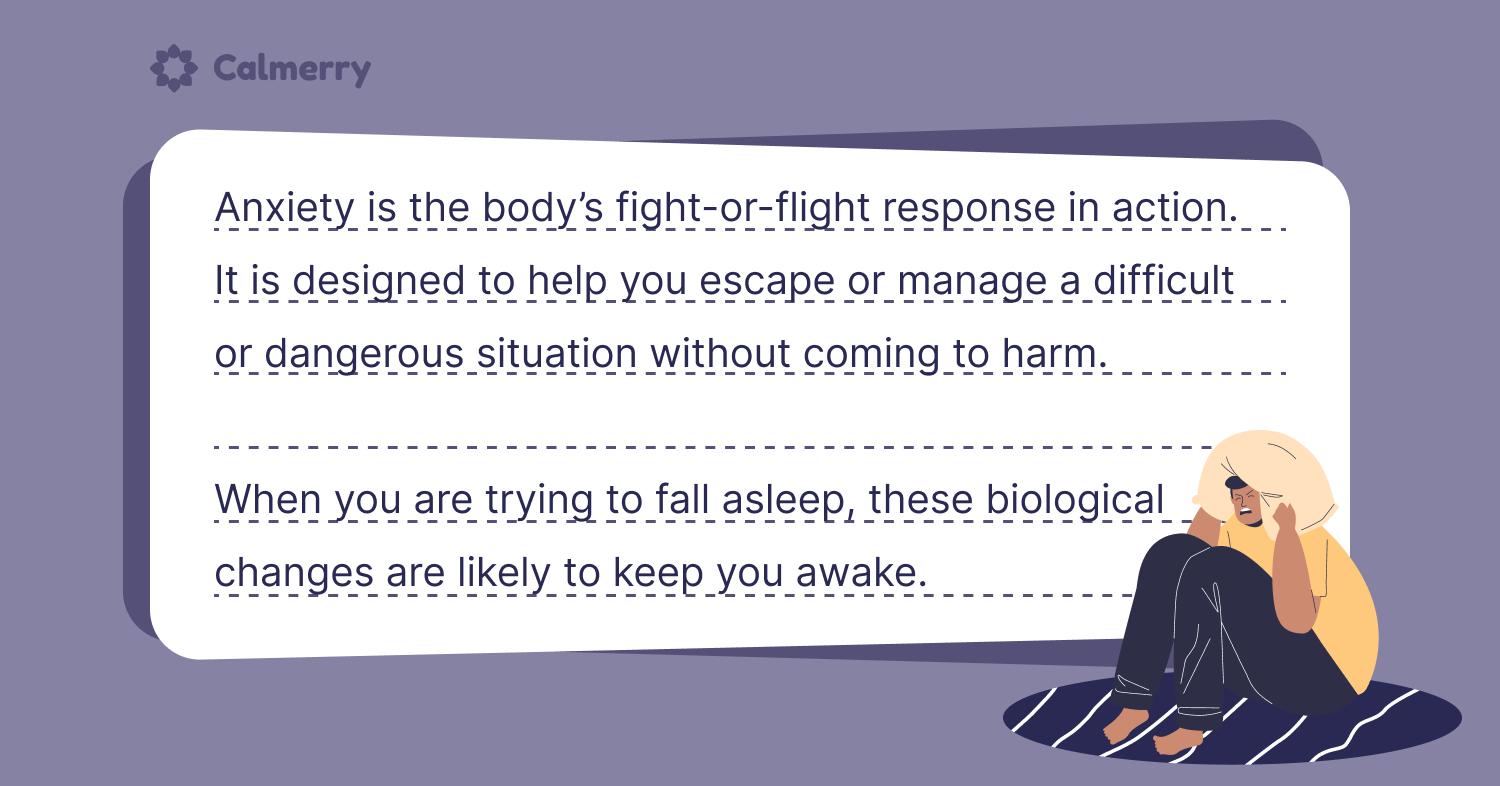
Why do I get anxiety at night?
When we feel anxious, we might feel our heart racing, our breathing becoming quicker or shallower, and our muscles tensing. This is the body’s fight-or-flight response in action. It is designed to help you escape or manage a difficult or dangerous situation without coming harm.
However, when you are trying to fall asleep, these biological changes are likely to keep you awake. The longer you lie awake worrying, the more frustrated and anxious you might become.
This vicious cycle continues until you finally fall asleep, only to wake in the morning feeling tired and irritable due to a poor night’s sleep. Feeling exhausted is clearly unhelpful when trying to manage anxiety.
Like many women, you probably feel like your life is hectic beyond belief. You rush from one job to the next, from morning to night. Juggling a career, childcare, and a social life can leave little time for reflection or processing during the day.
When you lie down in bed, all of the thoughts that you pushed to one side earlier in the day start to rise to the surface.
When your mind is free to roam, you may find yourself panicking about buying a birthday gift in time or finding time to write the work proposal that you didn’t have time for earlier.
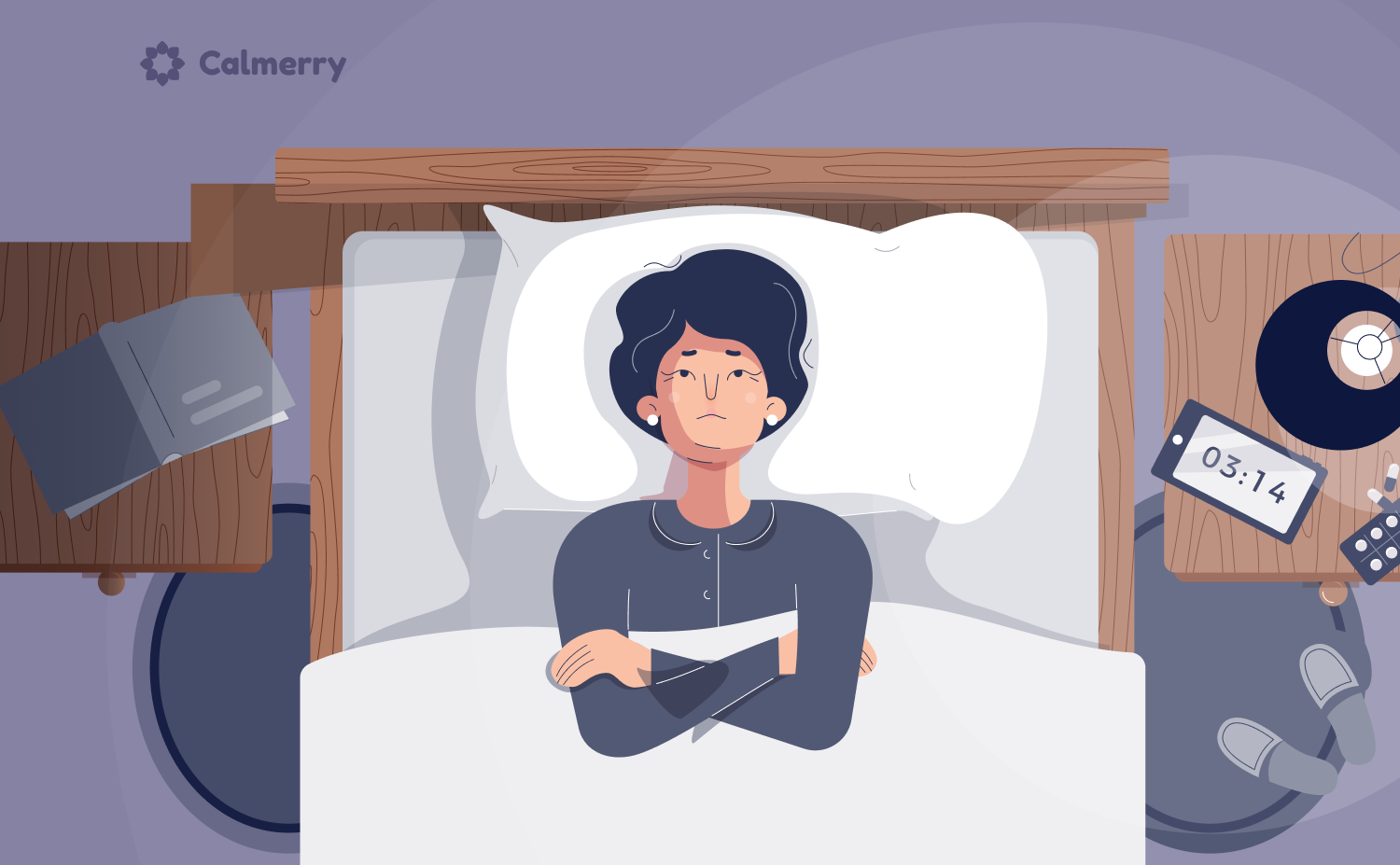
In the quiet of your bedroom, your worries get louder. Bedtime anxiety can make it feel impossible to get to sleep, and then you wake the next morning feeling drained and even less able to manage your anxiety symptoms.
Understanding more about nighttime anxiety can be a helpful first step in learning how to manage your symptoms for better overall health.
The symptoms of anxiety at night
Some women assume that difficult sleeping occurs as a result of insomnia or another sleep disorder. Some people have mild (or no) anxiety symptoms during the daytime but then realize that their anxiety is worse at night. Our list of symptoms may help you work it out if you have been struggling with this common problem.
The physical symptoms of anxiety may include:
- Feeling your heart racing (palpitations)
- Feeling breathless
- Feeling light-headed or as if the room is spinning
- Headaches
- Sweating
- Tremor or shaking
However, some people who experience anxiety at night don’t get the physical symptoms of anxiety. It is not uncommon to struggle with the mental symptoms of anxiety without the physical manifestations.
Psychological symptoms of anxiety include:
- Worrying about the past or future
- Feeling tearful
- Being unable to stop ruminating on thoughts or worries (in some cases obsessing over thoughts)
- Feeling nervous or tense
- Being unable to concentrate when reading before bed
- Being unable to relax or sleep
How to sleep with anxiety
When you feel anxious, being able to sleep well at night ensures that you are able to manage your worries the following day.
If you are tired or run down, managing anxiety can feel like an even bigger mountain to climb. Chronic stress has been shown to increase susceptibility to illness, so it is important to take steps to manage anxiety.
Suppose you are wondering how to stop anxiety at night. In that case, it is important to realize that there are many different methods for managing anxiety, as well as simple ways to increase feelings of relaxation and sleepiness at bedtime.
In the next section, we will explore the steps you can take to get back in control of anxiety at nighttime.
Exclude medical causes
Before you try any of the following recommendations in this article, it is important to be sure that your symptoms are not caused by a medical condition.
Certain illnesses can cause symptoms of anxiety, including chronic pain, diabetes, heart disease, and an overactive thyroid. Speak to your doctor if you think that your symptoms could have a medical cause.
Access psychological support
When you are wondering how to get rid of anxiety at night, it can seem like a daunting task at first. Online counseling can help you as you begin tackling your anxiety symptoms.
A licensed counselor will listen to you in confidence and make recommendations regarding how you could manage your feelings. If you already feel stretched too thin, online counseling can be an effective way to fit therapy into a busy or demanding schedule.
Cognitive behavioral therapy (CBT) has been shown to be effective in managing anxiety disorders to improve the quality of life. It is a skills-focused treatment that gives you the tools to manage your thoughts and behaviors to improve the way you feel.
It can take up to 16 weeks to see the benefits of CBT, so it is important not to expect results overnight but to use this treatment as a long-term strategy.
Consider short-term medication
Some people choose to speak to their doctor about starting medications to help with anxiety. These medicines are known as anxiolytics. They target certain chemicals in the brain to decrease excitability which may be causing anxiety symptoms.
Some anxiety medications can be taken for a few months, whereas others are to be taken for a few days only. Medications such as diazepam (Valium) might be prescribed for a few days to be taken at bedtime.
If you have barely slept due to anxiety, taking a short course may help to ‘reset’ and improve your sleep so that you are better able to manage the anxiety going forwards.
Make lifestyle changes
How to calm anxiety at night naturally? Sometimes, lifestyle changes can help you to break the cycle of anxiety at night.
Meditation during the day and at bedtime can help you to clear your mind of worrying thoughts or anxiety. Research has shown that mindfulness-based therapy reduces stress, anxiety, and depression. It may even boost the immune system, helping you recover from viral illnesses, such as the common cold or influenza.
If you haven’t tried meditation before, guided meditations are available online or on downloadable apps. Meditations can help you with feelings of anxiety or panic, and they may help you relax or fall asleep at night. Various mindfulness practices can also be a great addition to therapy.
Like meditation, breathing exercises are a good way to calm an anxious mind. Breathing deeply lowers feelings of stress in the body by telling the brain to calm down. Breathing exercises may also help reduce tension, easing aches and pains associated with any muscles that have been tensed. Breathing exercises can be done at any time, as often as required.
Grounding exercises are useful if you experience panic at night. At this time, it can be easy to lose track of the present, and so grounding yourself can relieve anxiety. Touch an object, say out loud where you are or what the date is. At nighttime, this can help you remain in the present and gradually resolve heightened anxiety.
Dive into good thoughts
Diamond Thaxton, Licensed Mental Health Counselor, notes: “Often people with anxiety are the best storytellers due to constantly engaging in fortune telling, making up events to worry about or catastrophizing situations. So, they should use that to their advantage at nighttime.”
Diamond goes on to explain: “One hack is to force your brain to go right into the ‘dream state’ while trying to fall asleep. Let your mind go wild with your favorite fantasies, or create your own amazing storyline with you as the main character.
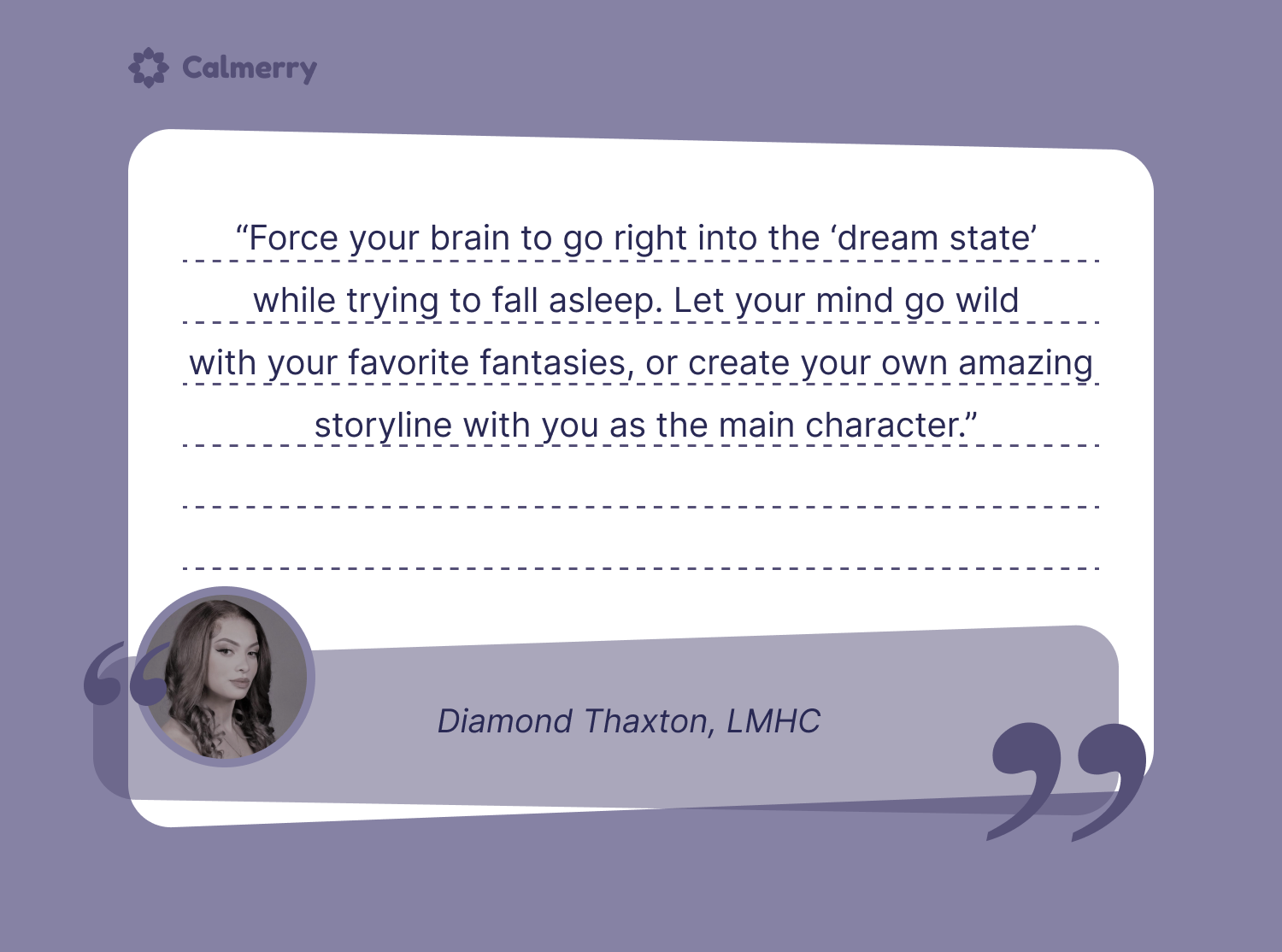
“This allows you to relax and release calming hormones. It also lets you disconnect from reality, which is one thing that sleep overall offers you. So, this technique allows you to replicate sleep actions, sending signals through your body that sleep is overcoming your body.”
Practice sleep hygiene
Sleep hygiene is a method of promoting better sleep. It involves creating a comfortable bedroom environment and a regular routine that promotes uninterrupted sleep at the right times.
Setting a sleep schedule is a helpful reminder that sleep is an essential part of your physical and emotional health. When you set a schedule, set a fixed wake-up time that is the same on weekdays and weekends to ensure consistent sleep.
You should also ensure that sleep is seen as a priority, even if this means missing a late-night social event. Sleeping in a consistent manner will help you optimize your quality of sleep.
If you go to bed but are still awake 30 minutes later, get up, read a book, or make a caffeine-free drink. Try going back to bed after this, and you may find you’re more successful this time.
Your bedtime routine should involve 30 minutes of wind-down time, which might include relaxation exercises or reading, dimming the lights, and practicing relaxation or breathing techniques. You should aim to be screen-free for 30 to 60 minutes before bed.
Get enough exercise
Daily exercise can help you to sleep more soundly at night, as long as you don’t do it too close to bedtime. Try to exercise in the morning or early afternoon for the best results.
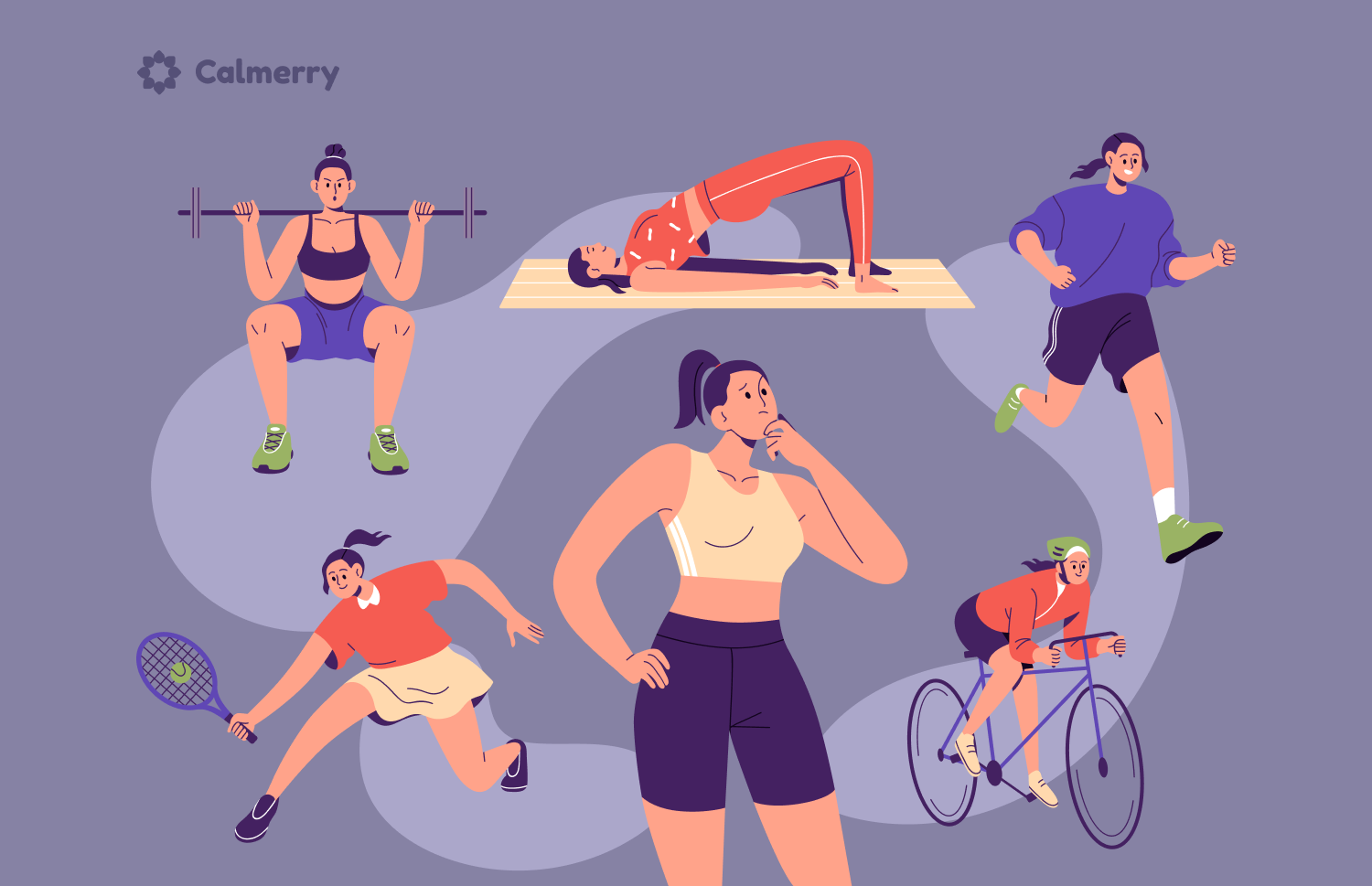
Avoid caffeine
Caffeine and other stimulants can prevent you from falling asleep. Coffee is widely known to make you feel alert, so having a late afternoon cup could be detrimental to falling asleep at bedtime. It is wise to reduce stimulants overall, but especially in the afternoon and evening.
Nighttime drinks
Drinks such as chamomile tea can be beneficial in managing symptoms of anxiety. In a 5 year study, chamomile tea was found to reduce moderate to severe anxiety symptoms significantly. Using chamomile has been proven to be a safe “treatment” option.
Invest in your bed
Saggy mattresses, flat pillows, and old quilts can all impede sleep. If you feel uncomfortable, you may find yourself increasingly frustrated. Invest in some more comfortable bedding that supports your body. If your bedroom feels more like a sanctuary, you may find yourself better able to sleep.
Try natural oils
The scent of some natural oils may help you sleep. Lavender essential oil prevents the release of acetylcholine, leading to a sedative effect that may improve sleep quality.
Using a lavender diffuser, or having an indoor potted lavender plant beside your bed, may make it easier for you to switch off at night rather than ruminating on anxious thoughts.
Final thoughts
Anxiety is common, and many people find that their anxiety is worse at night. This can lead to a vicious cycle of poor sleep and worsening anxiety. Fortunately, online therapy and some lifestyle changes can help you overcome this problem.
Making an appointment with a counselor, setting up a comfortable sleeping routine in a tranquil bedroom, and trying meditation or breathing exercises may all help to calm anxiety at nighttime.
online therapy
live video session

